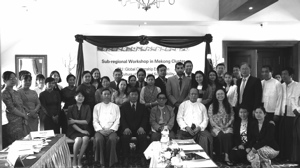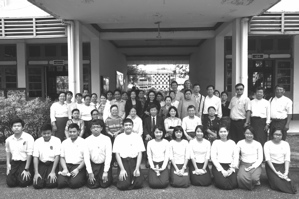- TOP
- 資料館
- FOCUS
- September 2014 - Volume Vol. 77
- Mekong Workshop on EIU/GCE
FOCUS September 2014 Volume Vol. 77
Mekong Workshop on EIU/GCE
At the behest of the Director General of UNESCO (Irina Bokova),1 the Asia-Pacific Centre of Education for International Understanding (APCEIU) started an educational initiative in Myanmar in mid-2014. APCEIU held its first activity in the country in collaboration with the Myanmarese government by holding a workshop for the Mekong subregion on 17 - 19 June 2014 in Yangon. A workshop exclusively for Myanmarese educators followed the Mekong subregional workshop.
The sub-regional workshop, co- organized with the UNESCO Asia and Pacific Regional Bureau for Education (UNESCO Bangkok), had the theme, “EIU: Global Citizenship Education for a Culture of Peace and Sustainability,” and was attended by thirty educators from Cambodia, Laos, Myanmar, Singapore, Thailand and Vietnam.
APCEIU
As the leading advocate of Education for International Understanding (EIU) in Asia- Pacific since 2000, APCEIU has been tirelessly holding workshops, seminars and teacher exchanges; publishing various materials including monographs on best practices on EIU; and undertaking research projects. As a mandated institution of UNESCO, it has been working with the Ministries of Education and other educational institutions in the Asia-Pacific. Teachers, education and school officials and other educators from the region have participated in its activities.2 Its current Director (Utak Chung) hopes that APCEIU will also become a regional hub for Global Citizenship Education (GCE).
Subregional Workshop
The holding of a subregional workshop on EIU and GCE in Yangon is significant in light of t he recent political developments in Myanmar. Professor Aung Tun Thet, Advisor to the President of the Republic of the Union of Myanmar, talked about re- engagement and recommitment to the global community in his welcome remarks. He also mentioned ethnic, political and religious tensions that should be resolved through dialogue with the government.
In relation to GCE he answered a number of questions:
- a. What are the traits of a good global citizen?
• Good character and fairness;
• Responsibility, trustworthiness, care and respect for others, the capacity to tolerate and utilize critical thinking.
- b. What do we want out of a global citizen?
• Tolerance;
• The ability to work together and embrace diversity;
• Responsibility for our actions;
• Critical thinking towards actions to promote peace and tolerance.
He emphasized the need to think globally and act locally.

Human Rights as a Theme
The opening ceremonies of the subregional workshop included a keynote speech by U Win Mra, the Chairperson of Myanmar National Human Rights Commission (MNHRC). In the speech, he stressed the role of education as the most effective means to understand and respect human rights. He emphasized that education must not only facilitate acquisition of knowledge on human rights. He raised the need for teachers to be trained and empowered.
He elaborated on the role of the MNHRC in providing a window of opportunity for people to enjoy human rights by being a mechanism for resolving conflicts and by facilitating human rights education.
He explained that the MNHRC did its own translation of the Universal Declaration of Human Rights and disseminated copies of it to many educational institutions. It held workshops on various issues such as business and human rights, human rights and the role of the media, Universal Periodic Review of the United Nations Human Rights Council, and the international human rights instruments. It has held training workshops for its staff on the Convention on the Rights of the Child, the Convention on the Elimination of All Forms of Discrimination Against Women, and the Convention on the Rights of Persons with Disabilities. It also held human rights education activities in thirty-seven townships on international human rights norms and standards.
The MNHRC has reached out to the religious leaders in the country. It has linked up with national human rights institutions in Southeast Asia through the Southeast Asia National Human Rights Institutions Forum (SEANF) and those in the whole region through the Asia-Pacific Forum of National Human Rights Institutions (APF). Chairperson Wra saw these linkages as important means to share and learn experiences in making the MNHRC work effectively.
Chairperson Wra also mentioned the necessity of having a law on the establishment of MNHRC. He expressed hope that such law would be enacted soon.
The keynote speech of Chairperson Wra put an important stress on human rights in the whole subregional workshop.
The workshop program had a slot for the discussion of human rights. A resource person3 gave a presentation on the background of the international human rights standards and explained the basic human rights principles by linking them to values.
The stress on the link between human rights and values echoed the welcome remarks of the representative of the Myanmarese government on the need for citizens to have values. It also related to the school syllabus in Singapore on discussing EIU by emphasizing certain values that are included in the school curriculum such as in social studies subject.
The subregional workshop opened another opportunity for educators in the Mekong subregion to network with each other in promoting EIU and GCE. The participants expressed their desire during the workshop to be involved in relevant projects being planned by their respective institutions.

For further information, please contact: APCEIU, 20, Saemal-ro, Guro-gu, Seoul, Republic of Korea (152-050); ph (82-2)774-3933; fax (82-2) 774-3958; www.unescoapceiu.org.
Endnotes
1. See “Sub-regional Workshop on EIU/GCE for Educators from Mekong Cluster Countries & National Capacity-building Workshop for Educators in Myanmar,” APCEIU News, www.unescoapceiu.org/board/bbs/board.php ?bo_table=m31&wr_id=430&page=3.
2. For more information about APCEI U visit www.unescoapceiu.org.
3. The presentation on human rights was given by Jefferson R. Plantilla of HURIGHTS OSAKA.
